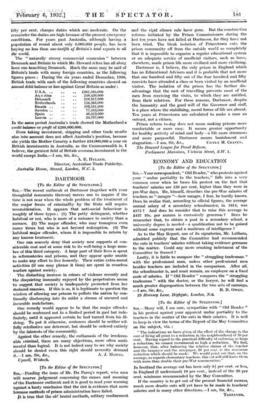[To the Editor of the Sisseraroa.] Sni„—Pending the issue of
Mr. Du Parcq's report, wise men will reserve judgement concerning the causes and meaning of' the Dartmoor outbreak and it is good to read your warning against a hasty conclusion that the riot is evidence that more humane methods of prison administration have failed.
it is true that the old brutal methods, solitary confinement
and the rigid silence rule have gone. But the constructive reforms initiated by the Prison Commissioners during the last ten years have not failed'at Dartmoor, for they have not been tried. The bleak isolation of Princetown cuts the prison community off from the outside world so completely that it is impossible to organize a regular educational system or an adequate service of unofficial visitors, such as have, elsewhere, made prison life more civilized and more civilizing.
Dartmoor is, I believe, the only prison in England which has no Educational Advisers and it is probable that not more that one hundred and fifty out of the four hundred and fifty Convicts have attended a class or been visited by an unofficial visitor. The isolation of the prison has the further dis- advantage that the cost of travelling prevents most of the men from receiving the visits, to which they are entitled, from their relatives. For these reasons, Dartmoor, despite the humanity and the good will of the Governor and staff, is a place where the stabilizing, moral forces of life are absent. Ten years at Princetown are calculated to make a man an outcast, not a citizen.
Prison reform to-day does not mean making prisons more comfortable or more easy. It means greater opportunity for healthy activity of mind and body—a life more strenuous and more purposeful. Dartmoor means banishment and
Parliament Mansions, Victoria Street, S.IVA.








































 Previous page
Previous page